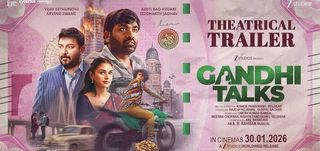
Hazaaron Khwaishen Aisi Hindi Movie
If you've ever wondered why our nation is in such a mess, "Hazaaron Khwaishein Aisi" attempts to tell you where we could... Show more
If you've ever wondered why our nation is in such a mess, "Hazaaron Khwaishein Aisi" attempts to tell you where we could have gone wrong.
Mishra's most complex, ambitious film to date, "Hazaaron..." knits the major political upheavals between 1969 and 1977 into a love triangle, as he minces no words in castigating the Nehruvian "ideals" that modern India adopted as its model for governance.
Death, says one song in this remarkably dense and evocative film, is akin to love. And Vikram (Shiney Ahuja) sees death every time Geeta (Chitrangda Rao) looks at her idol-lover, the protagonist, Sidharth (Kay Kay Menon).
Mishra's outstanding understanding of complex polemics motivating contradictions in modern Indian society has given us great pieces of alternative art in the past too - including the unusual thriller "Iss Raat Ki Subah Nahin".
Subsuming the murky and incoherent politics of Kolkata, New Delhi and Bihar's
Bhojpur district, "Hazaaron..." takes us on a strange stirring and reverberant journey into the erosion of the collective conscience in modern India.
Nobody cares. And those who seemed to lost their idealism in the welter of tortuous compromises that characterises India's journey into modernism.
Yet, if we look back in anger as Mishra does so coherently in this film, we see a social order based on brutal oppression of the socio-economically challenged.
Sahir Lidhianvi wrote the immortal lines "Jinhe naaz hai hind par woh kahan hain" to express the fatal disillusionments of Guru Dutt in "Pyaasa".
"Hazaaron..." is almost a modern day version of "Pyaasa", tracing Sidharth's journey from Marxist jargon to the Maoist (Naxalite) rebellion, as he rages on about injustice.
Like the prostitute Gulabo in "Pyaasa", Sidharth too succeeds in sucking the besotted Geeta into his ideological web.
It's interesting to see how the director amalgamates both the Waheeda Rehman and Mala Sinha characters of "Pyaasa" in "Hazaaron..." in Geeta.
Like Waheeda, Chitrangda Singh is willing to sacrifice everything and follow her man to the end of the world.
Like Mala Sinha she falls into a marriage of compromise and comfort with the well-meaning, alcoholic richie-rich (Ram Kapoor), but soon pulls back and re-focusses her priorities.
Mishra's Siddharth nearly ends up the same way too but is saved in the nick of time by a savage twist of irony - when Vikram, in a bid to rescue Siddharth from uniformed thugs, gets his identity interchanged with his friend's.
What follows is a most brutal interlude of violence - where Vikram is almost bludgeoned to dearth by two heartless cops in the fields of rural Bihar. His dying moments show Vikram, now reduced to a vegetable, resting his head on Geeta's shoulder, a place far away from the politics of the city.
Love, in Mishra's brutally unflinching scheme of nightmarish dreams, is a commodity that demands exorbitant compensation - as the commodious yet compact screenplay (Sudhir Mishra, Shiv Subramaniam, Ruchi Narain) knits the major political upheavals of the times into a love triangle.
Swift cuts (editing Catherine D'Hoir) and the relentlessly probing cinematography (Jacques Bouquin, Aseem Bajaj) suggest a close link between the politics of the state and the politics of the conscience.
The characters are monstrously challenged by their destiny. But the narrative is always ahead and unwavering in its perceptions of the blueprint of social revolution.
The performances are even, though not outstanding. Leading lady Chitrangda, evidently selected for her resemblance to Smita Patil - whom Sudhir Mishra sees as the epitome of political grace.
All the three protagonists seem to have understood the politics of Mishra's layered cinema, as he goes about making no bones about his contempt and cynicism for Nehruvian idealism.
This film lashes out at the Congress 'role-model' of governance almost to the point of denouncing and demolishing all that the architects of modern India dreamt of.
But will the audience follow the narrative's strident and unforgiving walk through the Nehru-Indira era'
If you've ever thought of why our nation is in such a mess, this is a film that tells you where we could have gone wrong. It offers no solutions, but makes you sit up and think.
A lot of what you will see in "Hazaar..." will seem unreal and bizarre. But there is no exaggeration - it simply presents the politics we've been gifted with by the architects of Indian democracy
|
|
Kay Kay Menon | |
|
|
Roshan Ahuja | |
|
|
Chitrangada Singh |
Director: Sudhir Mishra
Producer: PNC
Music Director: Shantanu Moitra
Cinematographer: Jacques Bouquin
Editor: Catherine Dhoir
Screenplay Writer: Sudhir Mishra
| 'Serious' Chitrangada Singh craves for song and dance - Feb 25, 2010 |
| Sudhir Mishra on Chitrangada's decision to quit - Aug 06, 2005 |





















